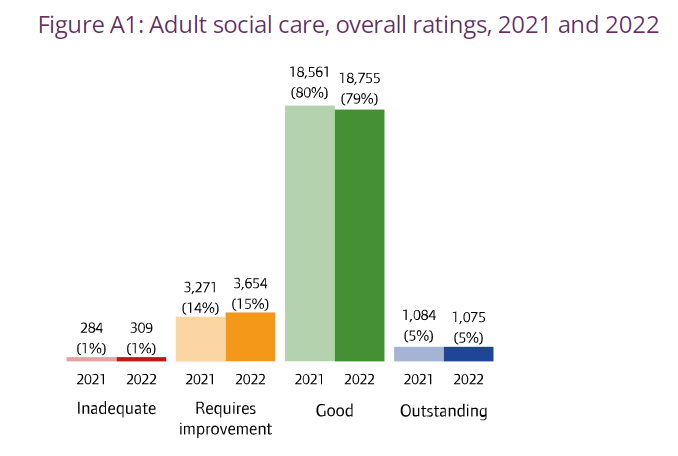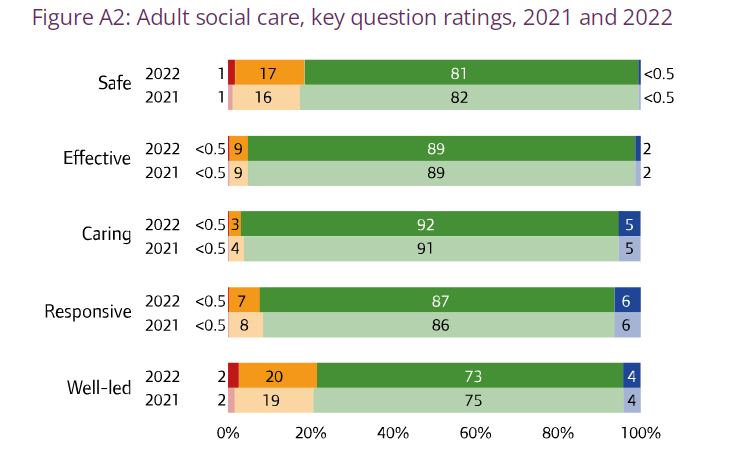@2021 invictIQ is a venture by Sprint Consultancy. All rights reserved. Privacy Policy.

Grooving to the Compliance Beat: Why Care Managers Should Make it the Hottest Priority?
by Mark Topps
Is compliance at the forefront of all you do? All too often, compliance ends up being a tick box exercise, and it is imperativet that this is not the pathway we take.
In this blog, I look at why compliance should be a top priority, but before diving in, let’s take a look at some of the statistics surrounding the compliance of England’s care sector.
When looking at the CQC State of Care Report 2021/2022, Adult social care services saw an increase in the number of ratings of requires improvement and inadequate across all 3 service types: residential homes, nursing homes and homecare. Services rated Good or Outstanding have reduced to 83% and the trend evidence that compliance within England has slipped.
In the State of Care Report the CQC highlights that the common non-compliance trends are related to the leadership, management and oversight of the service, driven by staffing challenges. These challenges included the availability of experienced managers, staffing levels and staff burnout. They manifested themselves in poor person-centred care, and not meeting basic care needs (for example pressure area care, oral care and nutrition and hydration). The CQC have reported numerous examples of exhausted staff responding inappropriately to challenges and an increase in the use of unauthorised or overly restrictive restraint.
It is not just social care that is impacted by compliance, with the CQC highlighting that thecare for people with a learning disability and autistic people is still not good enough. Despite multiple reviews and reports, people continue to face huge inequalities
when accessing and receiving health and social care. Mental health services are struggling to meet the needs of children and young people, increasing the risk of their symptoms worsening and reaching crisis point, and being cared for in unsuitable environments and there are ongoing problems with the Deprivation of Liberty Safeguards process, resulting in people being at risk of being unlawfully deprived of their liberty without the appropriate legal framework to protect them or their human rights.
Let’s look at the top 3 reasons we should ensure we remain compliant:
Legal Duty
We are bound to various laws and regulations, such as Health and Safety at Work, The Care Act and our regulatory requirements. Non-compliance can lead to legal fines, regulatory actions and consequences and could result in the organisation being closed down. We have touched on the findings by the CQC, and it is clear that they are on the ball when it comes to poor compliance.
Quality of Care
Compliance, when not a tick box exercise can help ensure that we provide high-quality care, continuously adapt and improve our processes and services and that we have the interests of the people we are supporting and our teams at the heart of all we do. Compliancy will help demonstrate a commitment to upholding the rights and dignity of vulnerable individuals.
Increased Trust and Reputation
We know from various reports and first hand experience that non-compliant services lose the trust of the people they are supporting, their representatives and the community around them. If you are a compliant service, you not only build the trust of those accessing your services, but also build a better reputation within the area and within the sector, often resulting in higher retention levels and more people wanting to use your services.
Let’s look at some of the challenges:
Resourcing
We have seen from the State of Care Report that the CQC have detailed how resourcing constraints have led to poor compliance. High turnover rates in the social care sector can make it difficult to maintain a consistent and well-trained workforce and lapses in compliance during the recruiting, onboarding and training of new staff members can easily happen if not kept on top of.
Budgets
I wish I didn’t see posts and comments from Registered Managers about unrealistic budgets, and having been there in the past, I know how much pressure this adds to remaining compliant. Many social care providers operate with limited budgets, which can make it challenging to invest in necessary resources and technology for compliance, such as effective job adverts, updated equipment, security systems or electronic records.
Constantly Changing Regulations and Guidance
Social Care over the last few years has been subjected to changing laws and regulations, resulting in it hard to keep up and stay afloat of expectations. Thrown into this mix was the pandemic, which made it near on impossible for some small providers to remain compliant.
Not only do we have the change regulations and guidance to keep on top of, but we must also navigate the complexity of them and the standard expected. Keeping track of and interpreting these accurately can be challenging.
Technology
It is not a shock to say that social care is behind the times, implementing technology and digital systems. Incorporating technology solutions for compliance, such as electronic MAR charts or digital care plans, can be a significant undertaking. It requires training staff, ensuring data security and managing potential disruptions during implementation.
There is still hope, let’s look at some of the strategies for achieving and maintaining compliance:
Training and Development
Invest in the ongoing training and development of your staff to ensure they are upskilled and informed about compliance requirements. You should ensure you have a comprehensive induction and training program that covers compliance requirements such as Health and Safety, GDPR etc. Staff meeting agendas should include updates to regulations and sharing best practices.
Documentation
Remember the golden rule of social care records – ‘if it isn’t documented, it didn’t happen’ – Make sure your service is maintaining thorough and accurate records to demonstrate compliance efforts. Care notes should be accurate and legible. It isn’t just care notes that need to be maintained but audit records, MAR charts, training dates and trackers for insurance expiry dates, boiler checks legionella checks etc.
Continuously Improve and Mitigate Risks
You should stive for a culture of collaboration and continuous improvement to adapt to changing compliance requirements.This can start with the audits you undertake within your service and following up on any areas that have been identified. Don’t see accidents and incidents as a negative, but as a chance to learn and grow from them.
Risk assessments can help improve compliance through mitigating identified risks, but you should also aim to have personalised policies, clear and streamlined processes which are all accessible to your team and these should all be reviewed on a regular basis.
Feedback will also enhance compliance and you can seek this from your staff, the people you support, their families and representatives and other stakeholders such as the professionals involved in people’s care. You can do this verbally or through surveys. Use this feedback to identify areas for improvement.
Risk assessments help improve compliance through mitigating risk, but you should also aim to have personalised policies, clear and streamlined processes which are all accessible to your team and these should all be reviewed on a regular basis.
Mock Inspections
Undertake mock inspections of your service and even better, get an outside consultant to do one so that areas for improvement can be identified.
Managing audit and inspection procedures can be time-consuming and tedious especially when they are scattered in paper copies, spreadsheets and emails. audIT On Cloud from InvictIQ helps you take back control with a centralised source of truth and automated workflows.
Network and Stay Informed
It wont all land on your lap, and you need to strive to network and stay updated. Following people like me on LinkedIn who share regular updates, subscribing to the regulators newsletters, attending care shows and events and networking can all help you stay informed of changes within the sector.
Remember, compliance is not just a matter of adhering to regulations, it’s about providing the best possible care to those who rely on it.
MORE ARTICLES

Mark Topps is a social care leader who has worked in the care industry since 2004 and is currently working as a regional support manager. He regularly advocates, appearing on television, radio and podcasts and has started many campaigns for change in legislation and culture within the industry. Mark is the co-founder of The Caring View which is a social care podcast, YouTube show and free resource initiative for the sector. He also co-founded The Health and Social Care Club, which is an audio event hosted on LinkedIn. Mark is also the social media and marketing director at the National Association of Care and Support Workers.
Share
Sign up for our newsletter


